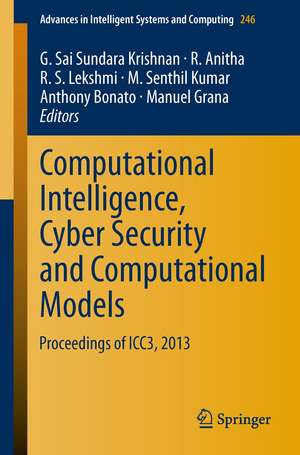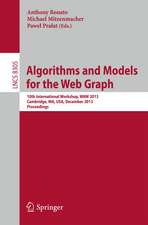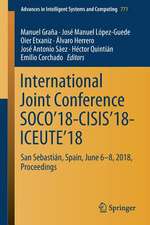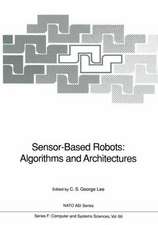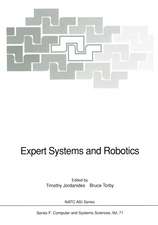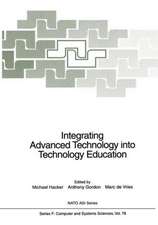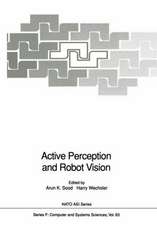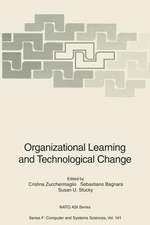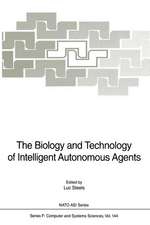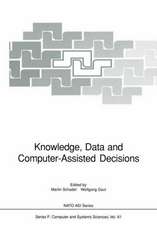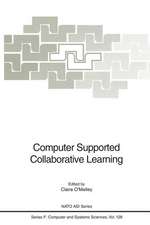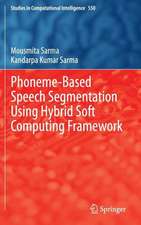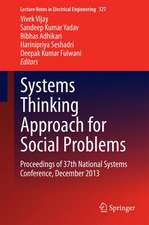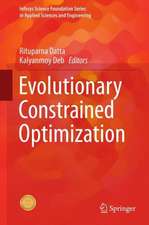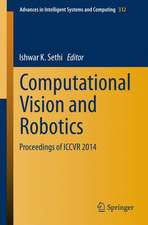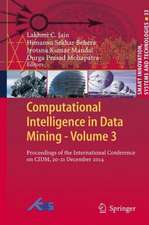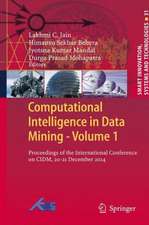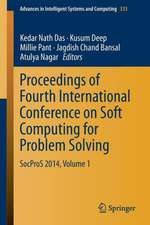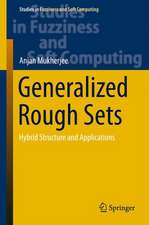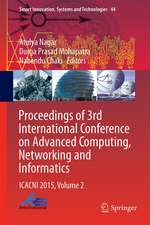Computational Intelligence, Cyber Security and Computational Models: Proceedings of ICC3, 2013: Advances in Intelligent Systems and Computing, cartea 246
Editat de G. Sai Sundara Krishnan, R. Anitha, R. S. Lekshmi, M. Senthil Kumar, Anthony Bonato, Manuel Grañaen Limba Engleză Paperback – 10 dec 2013
Din seria Advances in Intelligent Systems and Computing
- 20%
 Preț: 1120.87 lei
Preț: 1120.87 lei - 20%
 Preț: 1090.59 lei
Preț: 1090.59 lei - 20%
 Preț: 1324.07 lei
Preț: 1324.07 lei - 20%
 Preț: 1989.79 lei
Preț: 1989.79 lei - 20%
 Preț: 1946.92 lei
Preț: 1946.92 lei - 18%
 Preț: 1273.28 lei
Preț: 1273.28 lei - 20%
 Preț: 2264.51 lei
Preț: 2264.51 lei - 20%
 Preț: 1337.27 lei
Preț: 1337.27 lei - 20%
 Preț: 1297.67 lei
Preț: 1297.67 lei - 20%
 Preț: 1315.82 lei
Preț: 1315.82 lei - 20%
 Preț: 1310.88 lei
Preț: 1310.88 lei - 20%
 Preț: 1302.62 lei
Preț: 1302.62 lei - 20%
 Preț: 882.19 lei
Preț: 882.19 lei - 20%
 Preț: 1305.93 lei
Preț: 1305.93 lei - 20%
 Preț: 1629.32 lei
Preț: 1629.32 lei - 20%
 Preț: 1345.49 lei
Preț: 1345.49 lei - 18%
 Preț: 1227.52 lei
Preț: 1227.52 lei - 18%
 Preț: 1290.64 lei
Preț: 1290.64 lei - 20%
 Preț: 1041.10 lei
Preț: 1041.10 lei - 20%
 Preț: 1034.52 lei
Preț: 1034.52 lei - 20%
 Preț: 1298.50 lei
Preț: 1298.50 lei - 20%
 Preț: 1330.67 lei
Preț: 1330.67 lei - 20%
 Preț: 1483.28 lei
Preț: 1483.28 lei - 20%
 Preț: 1971.64 lei
Preț: 1971.64 lei - 20%
 Preț: 1006.48 lei
Preț: 1006.48 lei - 20%
 Preț: 1471.75 lei
Preț: 1471.75 lei - 20%
 Preț: 1471.56 lei
Preț: 1471.56 lei - 20%
 Preț: 1454.40 lei
Preț: 1454.40 lei - 20%
 Preț: 1494.84 lei
Preț: 1494.84 lei - 20%
 Preț: 1269.64 lei
Preț: 1269.64 lei - 20%
 Preț: 1481.64 lei
Preț: 1481.64 lei - 20%
 Preț: 1192.08 lei
Preț: 1192.08 lei - 20%
 Preț: 1298.50 lei
Preț: 1298.50 lei - 20%
 Preț: 1489.07 lei
Preț: 1489.07 lei - 20%
 Preț: 825.78 lei
Preț: 825.78 lei - 20%
 Preț: 1649.93 lei
Preț: 1649.93 lei - 20%
 Preț: 1463.49 lei
Preț: 1463.49 lei - 20%
 Preț: 1438.77 lei
Preț: 1438.77 lei - 20%
 Preț: 1474.22 lei
Preț: 1474.22 lei - 20%
 Preț: 1298.50 lei
Preț: 1298.50 lei - 20%
 Preț: 1327.35 lei
Preț: 1327.35 lei - 20%
 Preț: 1973.31 lei
Preț: 1973.31 lei - 18%
 Preț: 947.04 lei
Preț: 947.04 lei - 18%
 Preț: 1441.39 lei
Preț: 1441.39 lei - 20%
 Preț: 638.55 lei
Preț: 638.55 lei - 20%
 Preț: 1320.76 lei
Preț: 1320.76 lei - 20%
 Preț: 1948.56 lei
Preț: 1948.56 lei
Preț: 2189.11 lei
Preț vechi: 2736.39 lei
-20% Nou
Puncte Express: 3284
Preț estimativ în valută:
418.88€ • 438.52$ • 346.60£
418.88€ • 438.52$ • 346.60£
Carte tipărită la comandă
Livrare economică 05-19 aprilie
Preluare comenzi: 021 569.72.76
Specificații
ISBN-13: 9788132216797
ISBN-10: 8132216792
Pagini: 432
Ilustrații: XV, 416 p. 125 illus.
Dimensiuni: 155 x 235 x 23 mm
Greutate: 0.6 kg
Ediția:2014
Editura: Springer India
Colecția Springer
Seria Advances in Intelligent Systems and Computing
Locul publicării:New Delhi, India
ISBN-10: 8132216792
Pagini: 432
Ilustrații: XV, 416 p. 125 illus.
Dimensiuni: 155 x 235 x 23 mm
Greutate: 0.6 kg
Ediția:2014
Editura: Springer India
Colecția Springer
Seria Advances in Intelligent Systems and Computing
Locul publicării:New Delhi, India
Public țintă
ResearchCuprins
The Robber Strikes Back.- Some Applications of Collective Learning.- Subconscious Social Computational Intelligence.- Modeling Heavy-tails in Traffic Sources for Network Performance Evaluation.- The Future of Access Control: Attributes, Automation and Adaptation.- Optimal Control for an MX/G/1/N + 1 Queue with two Service Modes.- A Novel Approach for Gene Selection of Leukemia Dataset Using Different Clustering Methods.- A Study on Enhancing Network Stability in Vanet with Energy Conservation of Road Side Infrastructures Using LPMA Agent.- An Intuitionistic Fuzzy Approach to Fuzzy Clustering of Numerical Dataset.- ELM based ensemble classifier for Gas Sensor Array Drift Dataset.- Hippocampus Atrophy Detection Using Hybrid Semantic Categorization.- Hyper Quadtree based K-means Algorithm for Software Fault Prediction.- Implementation of Localized Region based Active Contour Segmentation for Volume Measurement of Urinary Bladder Using Ultrasound Images.- Improved Bijective Soft Set based Classification for Gene Expression Data.- Mammogram Image Classification Using Rough Neural Network.- Performance Assessment of Kernel based Clustering.- Registration of Ultrasound Liver Images Using Mutual Information Technique.- Sentiment Mining Using SVM based Hybrid Classification Model.- Shape based Image Classification and Retrieval with Multi-resolution Enhanced Orthogonal Polynomials Model.- Using Fuzzy Logic for Product Matching.- A Novel Non-Repudiate Scheme with Voice Feature Marking.-A Study of Spam Detection algorithm on Social Media Networks.- Botnets: A Study and Analysis.- Comparative Study of two and Multi Class Classification based Detection of Malicious Executables Using Soft Computing Techniques on Exhaustive Feature Set.- CRHA: An Efficient HA Revitalization to Sustain Binding Information of Home Agent in MIPv6 Network.- Interaction Coupling: A Modern Coupling Extractor.- Secure Multicasting Protocols in Wireless Mesh Networks - A Survey.- A New Reversible SMG Gate and its Application for Designing two’s Complement Adder/Subtractor with Overflow Detection Logic for Quantum Computer based Systems.- An Algorithm for Construction of Graceful Tree from an Arbitrary Tree.- Characterization of Semi-open Subcomplexes in Abstract Cellular Complex.- Fluid Queue Driven by an M/M/1 Queue Subject to Catastrophes.- Fuzzy VEISV Epidemic Propagation Modeling for Network Worm Attack.- Hexagonal Prusa Grammar Model for Context Free Hexagonal Picture Languages.- Iso-Triangular Pictures and Recognisability.- Job Block Scheduling with Dual Criteria and Sequence Dependent Setup Time Involving Transportation Times.- Modular Chromatic Number of Cm Cn.- Network Analysis of Bi-Serial Queues Linked with a Flowshop Scheduling System.- Solving Multi-Objective Linear Fractional Programming Problem Using First Order.- Taylor’s Series Approximation.- Voronoi Diagram based Geometric Approach for Social Network Analysis.- Comparative Analysis of Discretization Methods for Gene Selection of Breast Cancer Gene Expression Data.- Modified Soft Rough Set for Multiclass Classification.- A Novel Genetic Algorithm for Effective Job Scheduling in Grid Environment.- A Multifactor Biometric Authentication for the Cloud.- Accelerating the Performance of DES on GPU and a Visualization Tool in Microsoft Excel Spreadsheet.
Notă biografică
G. Sai Sundara Krishnan is Associate Professor in the Department of Applied Mathematics & Computational Sciences at PSG College of Technology, Coimbatore, India. He has published 15 papers in reputed international journals and conferences and edited two international conference proceedings. Currently, he is supervising nine research scholars pursuing their PhD degrees. His areas of research interest include digital topology and soft sets.
R. Anitha is Associate Professor in the Department of Applied Mathematics and Computational Sciences at PSG College of Technology, Coimbatore, India. Her research interests include cryptography, computer security, algorithms and computational models. She has supervised more than 10 PhD scholars. She has published over 40 research papers in refereed journals and has served as an editor for many conferences and workshops. She has served as a PC member for several international conferences such as ICoAC 2011, ICISS 2013, and ADCOM 2013 and organized many research workshops and conferences. She served as the principal investigator (PSG College of Technology) of CDBR-SSE project sponsored by NTRO, and is currently the consultant to SETS for a research project sponsored by the Department of Atomic Energy, Government of India. She is a member of several professional bodies including CRSI, ISTE, and ACM.
R. S. Lekshmi is Associate Professor in the Department of Applied Mathematics & Computational Sciences at PSG College of Technology, Coimbatore, India. She has authored 10 publications and guided many students’ projects on graph theory and networks. She has organized several research workshops/seminars and was the Program Chair for the International Conference on Mathematical and Computational Models held at PSG College of Technology in 2011.
M. Senthil Kumar is Associate Professor, Department of Applied Mathematics and Computational Sciences, PSG College of Technology, Coimbatore,India. He is the recipient of a post doctoral fellowship from the Department of Nanobio Materials and Electronics, (WCU), Gwangju Institute of Science and Technology, Gwangju, Republic of Korea under the guidance of Prof. K. Sohraby, Curators’ Professor, School of Electrical Engineering, University of Missouri-Kansas City. He has over 14 years of teaching and research experience. He has a PhD in retrial queueing models from Anna University, Chennai, India. His achievements are recognized and included in the biographies of Marquis Who’s Who in the World 2013. His fields of interest include retrial queueing theory, data communication, and reliability engineering. He serves as a reviewer for several international journals and has also published his research in several international journals of repute.
Anthony Bonato is the Associate Dean, Students and Programs in the Yeates School of Graduate Studies at Ryerson University and Editor-in-Chief of the journal Internet Mathematics. He has authored over 90 publications with 40 co-authors on the topics of graph theory and complex networks. In 2011 and 2009, he was awarded Ryerson Faculty SRC Awards for excellence in research. In 2012, he was awarded an inaugural YSGS Outstanding Contribution to Graduate Education Award.
Manuel Graña is currently full professor at the Computer Science and Artificial Intelligence of the University of the Basque Country (UPV/EHU), in the Facultad de Informatica in San Sebastian. His interests include machine learning and pattern recognition medical image processing and computer aided diagnosis systems, mobile robot navigation, multi-agent systems with natural inspiration, social network innovations via computational intelligence. The development of lattice computing approaches in these domains is his principal research endeavor. He is member of MIR Labs, IEEE, and ACM. He has chaired three international conferences (IWANN 2007, HAI 2010, KES 2012). He has served as an editor of more than 10 books. He has been advisor to more than 20 successful doctoral students. He has coauthored over 100 papers in high-impact research journals.
R. Anitha is Associate Professor in the Department of Applied Mathematics and Computational Sciences at PSG College of Technology, Coimbatore, India. Her research interests include cryptography, computer security, algorithms and computational models. She has supervised more than 10 PhD scholars. She has published over 40 research papers in refereed journals and has served as an editor for many conferences and workshops. She has served as a PC member for several international conferences such as ICoAC 2011, ICISS 2013, and ADCOM 2013 and organized many research workshops and conferences. She served as the principal investigator (PSG College of Technology) of CDBR-SSE project sponsored by NTRO, and is currently the consultant to SETS for a research project sponsored by the Department of Atomic Energy, Government of India. She is a member of several professional bodies including CRSI, ISTE, and ACM.
R. S. Lekshmi is Associate Professor in the Department of Applied Mathematics & Computational Sciences at PSG College of Technology, Coimbatore, India. She has authored 10 publications and guided many students’ projects on graph theory and networks. She has organized several research workshops/seminars and was the Program Chair for the International Conference on Mathematical and Computational Models held at PSG College of Technology in 2011.
M. Senthil Kumar is Associate Professor, Department of Applied Mathematics and Computational Sciences, PSG College of Technology, Coimbatore,India. He is the recipient of a post doctoral fellowship from the Department of Nanobio Materials and Electronics, (WCU), Gwangju Institute of Science and Technology, Gwangju, Republic of Korea under the guidance of Prof. K. Sohraby, Curators’ Professor, School of Electrical Engineering, University of Missouri-Kansas City. He has over 14 years of teaching and research experience. He has a PhD in retrial queueing models from Anna University, Chennai, India. His achievements are recognized and included in the biographies of Marquis Who’s Who in the World 2013. His fields of interest include retrial queueing theory, data communication, and reliability engineering. He serves as a reviewer for several international journals and has also published his research in several international journals of repute.
Anthony Bonato is the Associate Dean, Students and Programs in the Yeates School of Graduate Studies at Ryerson University and Editor-in-Chief of the journal Internet Mathematics. He has authored over 90 publications with 40 co-authors on the topics of graph theory and complex networks. In 2011 and 2009, he was awarded Ryerson Faculty SRC Awards for excellence in research. In 2012, he was awarded an inaugural YSGS Outstanding Contribution to Graduate Education Award.
Manuel Graña is currently full professor at the Computer Science and Artificial Intelligence of the University of the Basque Country (UPV/EHU), in the Facultad de Informatica in San Sebastian. His interests include machine learning and pattern recognition medical image processing and computer aided diagnosis systems, mobile robot navigation, multi-agent systems with natural inspiration, social network innovations via computational intelligence. The development of lattice computing approaches in these domains is his principal research endeavor. He is member of MIR Labs, IEEE, and ACM. He has chaired three international conferences (IWANN 2007, HAI 2010, KES 2012). He has served as an editor of more than 10 books. He has been advisor to more than 20 successful doctoral students. He has coauthored over 100 papers in high-impact research journals.
Textul de pe ultima copertă
This book contains cutting-edge research material presented by researchers, engineers, developers, and practitioners from academia and industry at the International Conference on Computational Intelligence, Cyber Security and Computational Models (ICC3) organized by PSG College of Technology, Coimbatore, India during December 19–21, 2013. The materials in the book include theory and applications for design, analysis, and modeling of computational intelligence and security. The book will be useful material for students, researchers, professionals, and academicians. It will help in understanding current research trends and findings and future scope of research in computational intelligence, cyber security, and computational models.
Caracteristici
Provides information on recent research trends in areas of computational intelligence, cyber security, and computational models Includes theories and applications to provide design, analysis, and model for key areas in computational intelligence, cyber security, and computational models Includes comprehensive security analysis, assessment, and actions to protect critical infrastructures and sensitive information Discusses efficient computational algorithms and vigorous tools for efficient implementation
